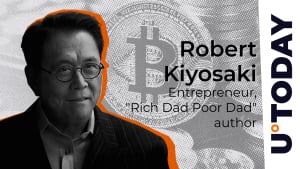
Disclaimer: The opinions expressed by our writers are their own and do not represent the views of U.Today. The financial and market information provided on U.Today is intended for informational purposes only. U.Today is not liable for any financial losses incurred while trading cryptocurrencies. Conduct your own research by contacting financial experts before making any investment decisions. We believe that all content is accurate as of the date of publication, but certain offers mentioned may no longer be available.
Ki Young Ju, founder and CEO of the CryptoQuant on-chain analytics company, has taken to social media to share his take on the prospects of the U.S. adopting the Bitcoin Standard in the near future.
He believes this adoption is rather unlikely, explaining why this might not happen.
Big issue with Bitcoin Standard for U.S. per Ju
Ki Young Ju published a long read, explaining why he has strong doubts about the U.S. adopting the Bitcoin Standard in the near future. Ju recalled the late 1990s, when gold bugs, including Peter Schiff, began to advocate the return of the U.S. dollar to the gold standard.
However, Ju said, that happened during an economic crisis. Overall, Ju said, gold has surged, throughout the whole U.S. history, at times when the United States “perceived a threat to its dominance in the global economy” and debates about the gold standard would begin to gain traction.
A similar thing is happening about not gold but Bitcoin as BTC enthusiasts and maximalists are advocating for adopting the Bitcoin Standard. “Now, Bitcoin seems to be filling the ideological space once occupied by gold,” Ki Young Ju stated.
Ju admitted that he thoroughly supports the idea of the U.S. adopting the Bitcoin Standard. However, he doubts that the U.S. would adopt Bitcoin as a strategic asset. In order for that to happen, the country will have to face a significant threat to its global economic dominance.
The U.S. government may indeed begin to purchase Bitcoin and stack it for risk management or economic leverage, however, it could happen for totally different motivations than Bitcoiners think.

 Vladislav Sopov
Vladislav Sopov Dan Burgin
Dan Burgin